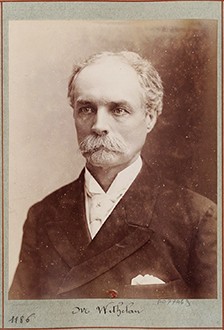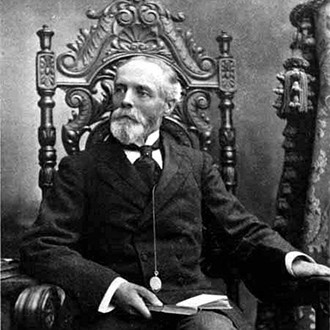Whitelaw Reid, 1837 – 1912
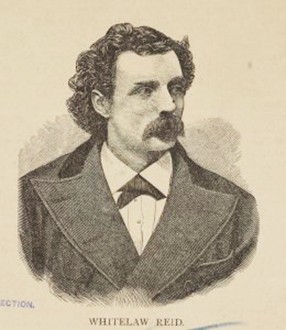
The Miriam and Ira D. Wallach Division of Art, Prints and Photographs: Print Collection, The New York Public Library. "Whitelaw Reid." The New York Public Library Digital Collections. https://digitalcollections.nypl.org/items/990b36ad-8efe-3364-e040-e00a18061505
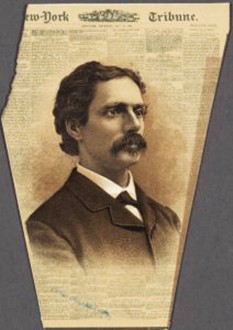
The Miriam and Ira D. Wallach Division of Art, Prints and Photographs: Print Collection, The New York Public Library. "Whitelaw Reid." The New York Public Library Digital Collections. https://digitalcollections.nypl.org/items/99308c2c-c22d-583f-e040-e00a18061875
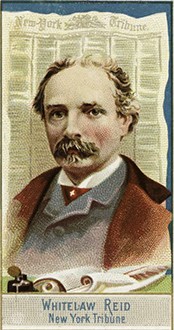
George Arents Collection, The New York Public Library. "Whitelaw Reid. New York Tribune." The New York Public Library Digital Collections. https://digitalcollections.nypl.org/items/510d47da-97e1-a3d9-e040-e00a18064a99
1837
- Born on October 27, 1837 in Cedarville, Ohio to Robert Charlton Reid (1795–1865) and Marion Whitelaw Ronalds (1804–1895). Attended Xenia Academy in his hometown. His family was poor.
1856 – 1859
- B.A., Miami University (Ohio), 1856.
- Superintendent of schools of South Charleston, Ohio, 1856 – 1858.
- Editor of Xenia News, 1858 – 1859.
- M.A. Miami University, 1859.
1860s
- City editor, Cincinnati Gazette, 1861.
- 1861 – 1862, War correspondent for the Cincinnati Gazette, reporting directly from the front at Gettysburg and Shiloh.
- Buys his small-town newspaper, Xenia News.
1868 – 1869
- Horace Greeley names him chief editorial writer of the New York Tribune in the summer of 1868.
- Greeley names him managing editor of the New York Tribune in the Spring of 1869.
1872 - 1876
- Honorary M.A., NYU, 1872
- Greeley resigns from the editorship of the New York Tribune in order to run for the U.S. Presidency; Reid is unanimously chosen by the board of directors to fill his place; when Greeley loses the election, he returns as editor but dies shortly thereafter, leaving the paper in dire financial straits.
- With financial support from numerous friends, Reid takes over the New York Tribune, which achieves great influence and prosperity under his control and relentless work.
- On April 10, 1875, the Tribune opens its new headquarters, built between 1873 – 1875 in New York City's Financial District. Reid oversees the entire project, even outfitting sleeping quarters inside the "skyscraper" so he can closely monitor all facets of the paper as writer, printer, publisher, circulation manager.
1877 – 1880
- Declines President Hayes' offer to become the U.S. Ambassador to Germany.
- 1878, elected Regent for life of the University of the State of New York.
- Honorary M.A,. Dartmouth, 1878.
- L.L.D., Miami University (Ohio), 1880.
![Rare Book Division, The New York Public Library. "BANQUET IN HONOR OF THE HONORABLE WHITELAW REID [held by] OHIO SOCIETY OF NEW YORK [at] "DELMONICO'S, NEW YORK, NY" (HOT;)" The New York Public Library Digital Collections. 1892. https://digitalcollections.nypl.org/items/510d47db-22dd-a3d9-e040-e00a18064a99 Rare Book Division, The New York Public Library. "BANQUET IN HONOR OF THE HONORABLE WHITELAW REID [held by] OHIO SOCIETY OF NEW YORK [at] "DELMONICO'S, NEW YORK, NY" (HOT;)" The New York Public Library Digital Collections. 1892. https://digitalcollections.nypl.org/items/510d47db-22dd-a3d9-e040-e00a18064a99](/sites/default/files/styles/cu_crop/public/content/nypl.digitalcollections.510d47db-22dd-a3d9-e040-e00a18064a99.001.w.jpg?itok=apg41Xvx)
Rare Book Division, The New York Public Library. "BANQUET IN HONOR OF THE HONORABLE WHITELAW REID [held by] OHIO SOCIETY OF NEW YORK [at] "DELMONICO'S, NEW YORK, NY" (HOT;)" The New York Public Library Digital Collections. 1892. https://digitalcollections.nypl.org/items/510d47db-22dd-a3d9-e040-e00a18064a99
![Rare Book Division, The New York Public Library. "BANQUET TO THE HON. WHITELAW REID, MINISTER OF THE UNITED STATES TO FRANCE [held by] CHAMBER OF COMMERCE OF THE STATE OF NEW YORK [at] "DELMONICO'S, NEW YORK, NY" (HOTE;)" The New York Public Library Digital Collections. 1892. https://digitalcollections.nypl.org/items/510d47db-22df-a3d9-e040-e00a18064a99 Rare Book Division, The New York Public Library. "BANQUET TO THE HON. WHITELAW REID, MINISTER OF THE UNITED STATES TO FRANCE [held by] CHAMBER OF COMMERCE OF THE STATE OF NEW YORK [at] "DELMONICO'S, NEW YORK, NY" (HOTE;)" The New York Public Library Digital Collections. 1892. https://digitalcollections.nypl.org/items/510d47db-22df-a3d9-e040-e00a18064a99](/sites/default/files/styles/cu_crop/public/content/nypl.digitalcollections.510d47db-22df-a3d9-e040-e00a18064a99.001.w.jpg?itok=TyRwN9WJ)
Rare Book Division, The New York Public Library. "BANQUET TO THE HON. WHITELAW REID, MINISTER OF THE UNITED STATES TO FRANCE [held by] CHAMBER OF COMMERCE OF THE STATE OF NEW YORK [at] "DELMONICO'S, NEW YORK, NY" (HOTE;)" The New York Public Library Digital Collections. 1892. https://digitalcollections.nypl.org/items/510d47db-22df-a3d9-e040-e00a18064a99
1881
- Declines President Garfield's offer to become Ambassador to Germany.
- Marries Elisabeth Mills.
1889 - 1892
- Accepts appointment from President Benjamin Harrison as U.S. Minister to France; steps down as editor of the Tribune.
- On the occasion of the centenary of the French Revolution, presents the City of Paris with a smaller bronze replica of Bartholdi's Statue of Liberty. Given by the Committee of the Americans of Paris, it was installed and unveiled in 1889 at the Pont de Grenelle; it then faced the Eiffel Tower and pointed its torch in the direction of the Elysée. In 1937, it was repositioned to face the direction of New York City.
- The farewell banquet given in honor of Whitelaw and Elisabeth Reid upon their departure from Paris is described for readers back in the United States as:
- "[...] one whose magnificence and dignity were commensurate with the demands of a diplomatic occasion. The French and American flags were intertwined, and a profusion of flowers also decorated the Salle de fête of the Continental, and the orchestra played 'Hail Columbia' and the 'Marseillaise,' and international toasts were proposed and responded to with post-prandial eloquence. Mr. Reid has ably filled his office, and his retirement is received with regret by both governments (The Boston Budget, March 21, 1892).
- Dozens of laudatory speeches are given; one such speech, reprinted in a commemorative booklet published by Brentano's, praises the Reids: "It is a happy reflection to indulge, that Mr. Reid, aided so gracefully by his accomplished wife, whose noble character adorns American womanhood, has done much to knit France and our United States in closer bonds of amity and good-will" (52).
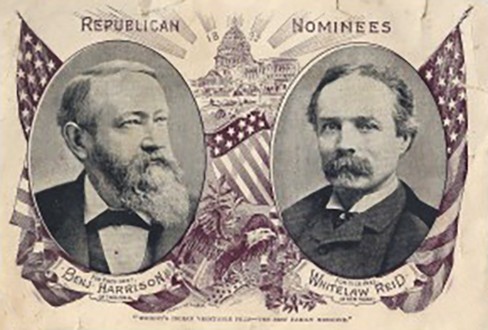
1892 Benjamin Harrison (and VP nominee Whitelaw Reid) Republican Presidential Candidacy Trade Card. Issued as an advertising plug for Wright's Indian Vegetable Pills. https://heritagesquarephx.org/news/high-society-at-heritage-square/
1892
- The Reids return to the U.S. and Whitelaw runs as the Republican candidate for Vice President on the ticket with Benjamin Harrison. They lose to Grover Cleveland and Adlai Stevenson.
- Returns as editor of the Tribune.
1894 – 1895
- 7-month tour of North Africa and France with Elisabeth, November 1894 – June 9, 1985. They visit Gibraltar, Algiers, Egypt, Palestine, Beirut, Marseilles, Paris.
1897 – 1901
- Appointed by President McKinley as Special Ambassador to Queen Victoria’s Diamond Jubilee.
- Appointed by President McKinley to the Spanish-American Peace Commission to assist in negotiating the Treaty of Paris, which ends the Spanish-American War in 1898.
- Honorary L.L.D., Princeton University, 1899
- Honorary L.L.D., Yale University, 1901
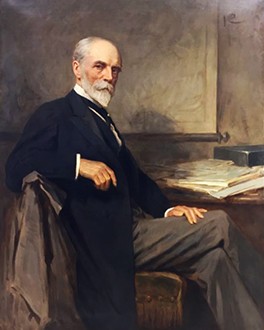
Painting, oil on canvas, by Sir George Reid of Whitelaw Reid, Chancellor 1902-1904, Regents Room Collection, State Education Building, Albany, New York. https://uk.usembassy.gov/us_ambassador_whitelaw_reid_1905-1912/
1902
- Appointed by President Theodore Roosevelt as Special Ambassador to the coronation of King Edward the VII.
- Receives the LL.D. degree honoris causa from the University of Cambridge in June.
1902 – 1904
- Becomes Vice-Chancellor and, in 1904, Chancellor of the University of the State of New York.
![Rare Book Division, The New York Public Library. "DINNER TO WHITELAW REID [held by] REPUBLICAN CLUB OF THE CITY OF NEW YORK [at] "NEW YORK, NY" (OTHER (PRIVATE CLUB?);)" The New York Public Library Digital Collections. 1905. https://digitalcollections.nypl.org/items/510d47db-7267-a3d9-e040-e00a18064a99 Rare Book Division, The New York Public Library. "DINNER TO WHITELAW REID [held by] REPUBLICAN CLUB OF THE CITY OF NEW YORK [at] "NEW YORK, NY" (OTHER (PRIVATE CLUB?);)" The New York Public Library Digital Collections. 1905. https://digitalcollections.nypl.org/items/510d47db-7267-a3d9-e040-e00a18064a99](/sites/default/files/styles/cu_crop/public/content/nypl.digitalcollections.510d47db-7267-a3d9-e040-e00a18064a99.001.w%20%281%29.jpg?itok=f7hmsOy9)
Rare Book Division, The New York Public Library. "DINNER TO WHITELAW REID [held by] REPUBLICAN CLUB OF THE CITY OF NEW YORK [at] "NEW YORK, NY" (OTHER (PRIVATE CLUB?);)" The New York Public Library Digital Collections. 1905. https://digitalcollections.nypl.org/items/510d47db-7267-a3d9-e040-e00a18064a99
1905 – 1912
- Appointed by President Roosevelt as Ambassador of the U.S. at the Court of St. James.
- Arrives in England on June 3, 1905 via the American steamer, Philadelphia.
- Honorary L.L.D, St. Andrews, Scotland, 1905
- Honorary D.C.L., Oxford University, 1907
- Reappointed as Ambassador to the Court of St. James in 1909 by President Taft.
- Honorary L.L.D, Victoria University, Manchester, England, 1909.
1912
- December 15, dies unexpectedly after an asthma attack, though he had suffered for years from bronchial ailments.
- King George himself sends word to President Taft of Reid’s death. By request of the King, his requiem mass is held at Westminster Abbey, led by the Archbishop of Canterbury. The King arranges for the British ship Natal to transport Reid's body back to New York.
- His funeral, which attracts throngs of people, is held on January 4, 1913 at the Cathedral of St. John the Divine. His coffin, headed for Sleepy Hollow Cemetery in Tarrytown, NY, is escorted by sailors and marines from the Atlantic Fleet.
- Elisabeth inherits a controlling interest in the Tribune, which is now directed by their son, Ogden.
Sources
- “Ce qui se passe: échos de Paris.” Le Gaulois : littéraire et politique, May 26, 1889, p. 1. Gallica.
- Contosta, David R. and Jessica R. Hawthorne. Rise to World Power: Selected Letters of Whitelaw Reid, 1895-1912. Philadelphia: American Philosophical Society, 1986.
- Cortissoz, Royal. The Life of Whitelaw Reid, volumes 1 and 2. New York: Charles Scribner’s Sons, 1921.
- "The Farewell Banquet." The Boston Budget, March 21, 1892, n.p. RH archives.
- “Lettres d’Amérique.” Journal des débats politiques et littéraires, April 10, 1889, p.2. Gallica.
- "Mr. Reid Buried in Sleepy Hollow." The New York Times, January 5, 1913, p. 3.
- “Mr. Reid's Career Mirrors Success: Journalism, Public Affairs and ...” New-York Tribune, December 16, 1912, p. 1. ProQuest Historical Newspapers.
- “Mr. Whitelaw Reid.” The New York Herald European edition, March 25, 1892, pp. 1-2. Gallica.
- “Newspaper of To-Day: Speech at Yale by Hon. Whitelaw Reid.” The Hartford Courant, February 26, 1901, p. 1. ProQuest Historical Newspapers
- “Nominee Reid Informed.” The New York Times, June 22, 1892, p. 9.
- O'Kane. "Le nouveau ministre des États-Unis à Paris." Le Figaro, April 12, 1889, p. 1. Gallica.
- "Reid Reaches London." The New York Times, June 4, 1905, p.4.
- “Reid, Whitelaw.”
- "To Bring Mr. Reid's Body." The New York Times, December 19, 1912, p. 6.
- "Whitelaw Reid Dies in London." The New York Times, December 16, 1912, pp. 1-2.
- "Whitelaw Reid Home Again." The New York Times, June 9, 1895, p. 5.
- "Whitelaw Reid Left Estate to his Wife." The New York Times, January 11, 1913, p. 11.
- “Whitelaw Reid On Great Issues: Address.” San Francisco Chronicle, June 23, 1903, p. 12. ProQuest Historical Newspapers.
